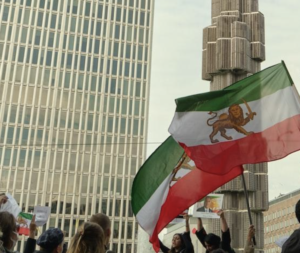
By Ziti Lei, Head of Volunteering at KCL Streetlaw
Mahsa Amini, a 22-year-old Kurdish woman from the north-western city of Saqez, died in Tehran, Iran, under suspicious circumstances, allegedly due to police brutality.
Ms. Amini was arrested by religious morality police for violating the government’s standard of hijab-wearing. She died the day after, having been taken to a detention centre to be “educated”. The witness who was detained with Ms. Amini said she was “severely beaten” which ultimately caused her death. The police denied this allegation and claimed she died of a heart problem.
However, the police statement about her death is unconvincing as her leaked medical scans, support a diagnosis of cerebral haemorrhage and stroke. This further highlights the prevailing deep-rooted mistrust towards religious police and the local government. According to Financial Times research, a number of women who had been taken to the morality police centre in Tehran are reported to have witnessed the use of physical and verbal violence.
Resulting Protests
Outraged by the brutality of the religious police and the long-time repressive acts against women, Amini’s death has resulted in a series of large-scale protests in Iran.
Protests first erupted in her hometown in northwest Iran after her funeral on the 17th of September, and soon spread to Tehran and other cities. Protesters burned headscarves, cut their hair, attacked symbols of the regime, and clashed with police. In Tehran, students confronted the police, voicing their anger over restrictions on their freedom. Many female students from the all-female Al-Zahra University removed their headscarves to show their support for the protest.
At the same time, more reports of repressive acts against women are reported after the death of Ms Amini. Some include incidents of women that were restricted from entering government offices and banks for not following Islamic dress code. Videos have been posted on social media, showing more violent acts of officers, including “detaining women, dragging them on the ground, and forcefully whisking them away”. Many Iranians, including pro-government individuals, are voicing their outrage on social media platforms against the “very existence of the morality police”.
Facing raging public anger and an increasingly politicised backlash, the Iranian government tried different means to suppress the protests. In the street, the government launched several violent crackdowns. They shot protesters with birdshot as well as metal pellets, deployed tear gas and water cannons. In reaction to the growing attention and critics from social media, the government blocked access to many apps including Instagram as well as WhatsApp, and limited internet access to reduce the protesters’ ability to organise. According to the report of BBC News on the 28th September, Iranian security forces have caused the death of, at least, 76 protesters during the unrest. Some experts compare this internet blackout with the total internet shutdown in 2019, saying they present a “similar pattern”.
A Turning Point For Human Rights In Iran?
This event might be a turning point for human rights in Iran because of the wide international attention and a large-scale demonstration.
The protests in Iran garnered international attention, including a statement from the United Nations High Commissioner for Refugees, focusing on violence against women in the Islamic Republic of Iran and urging an impartial investigation of Amini’s death. Several leaders around the world condemned the incident publicly and announced sanctions against the Iranian morality police. President Joe Biden stated that the US will stand with the brave women of Iran, while he promised further costs “on perpetrators of violence against peaceful protestors”. The United States and the British government both issued a series of sanctions over the Iranian government’s violent repression and expanded the target scale from morality police to senior officials. More states are expected to follow the same sanctions on Iranian governments in the following days.
Will this event produce something more meaningful than the Girls of Revolution Street movement in 2018, which ended with no real progress and renewed repression? Maybe this time there will be a lasting change. The unprecedented bravery shown by young women is very inspiring. Also, exhausted by long-time economic hardship and corrupted government, many young men and older generations joined the crowds of protesters. This event marked a fundamental change. According to an independent survey, most Iranians think hijab-wearing is a woman’s choice rather than a mandatory religious regulation. In 2020, 72% Iranians opposed compulsory hijab. There is no doubt that Iranian people are now strongly aiming for change.
What Can Be Done To Help?
- Stop violent repression and internet blackouts
The violent crackdowns launched by regime leader of Iran have caused many deaths. Also, the government is trying to brush off blame for Amini’s death and repress the protest by disrupting the internet services and usage of social networks, such as WhatsApp and Instagram. Therefore, more attention and pressure is needed from the international society to urge Iran to stop violent repression and internet blackouts.
- An impartial investigation needed
The acting High Commissioner for Human Rights, Ms. Al-Nashif, said that Amini’s “tragic death and allegations of torture and ill-treatment” must “be promptly, impartially and effectively investigated”. An independent third party may intervene if the violent suppression continues and the Iranian government refuses to conduct an impartial investigation.
- Human rights should be respected
Spokesperson for the UN rights office OHCHR, Ms. Shamdasani, also stated that “women should not be punished for what they are wearing” and “women who defy these compulsory veiling rules should not be harassed, should not be subjected to violence.” The UN and other international organisations should urge Iran to respect basic human rights and women’s rights in their country.